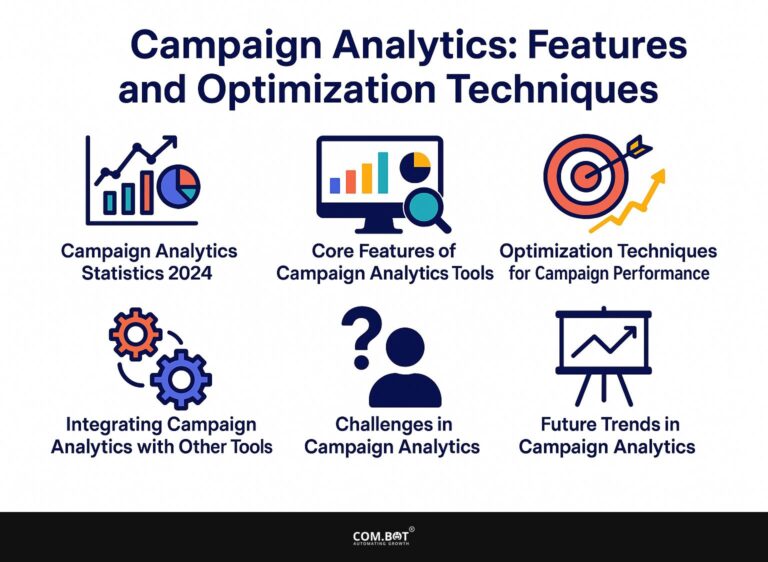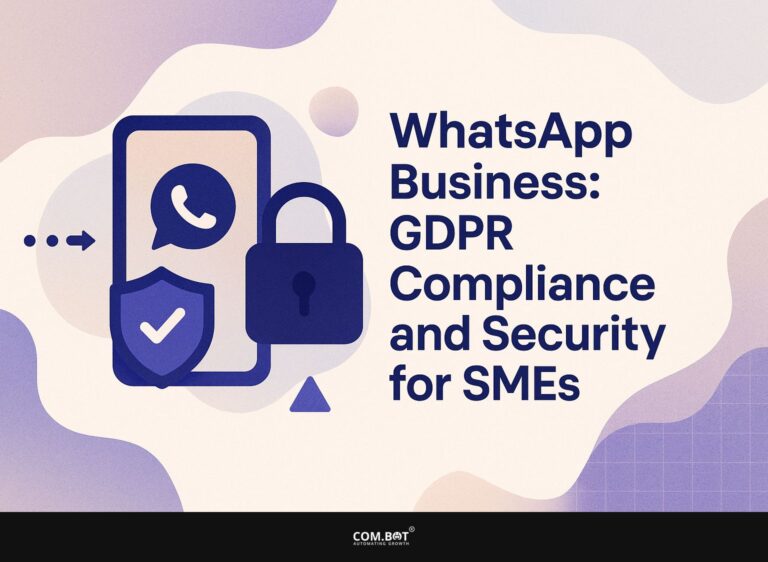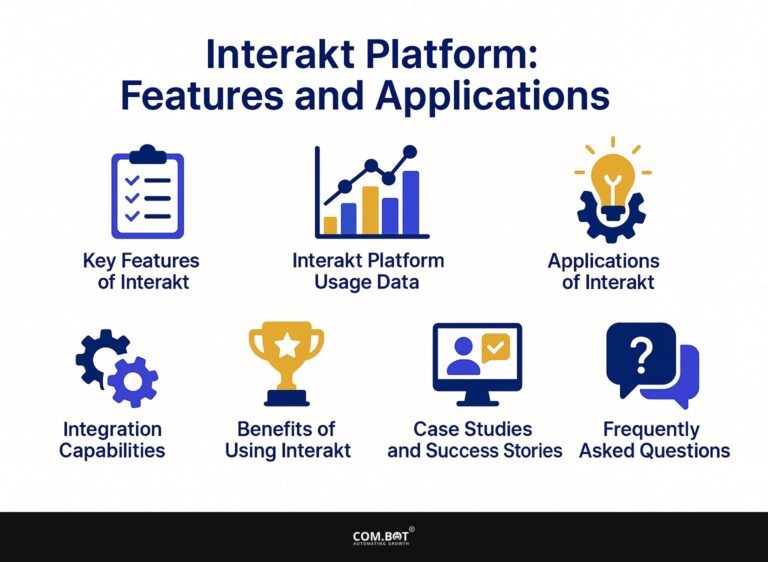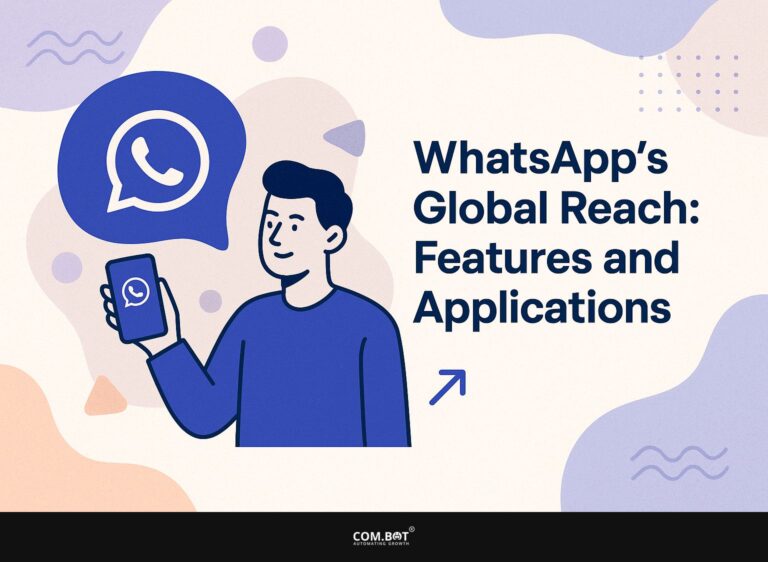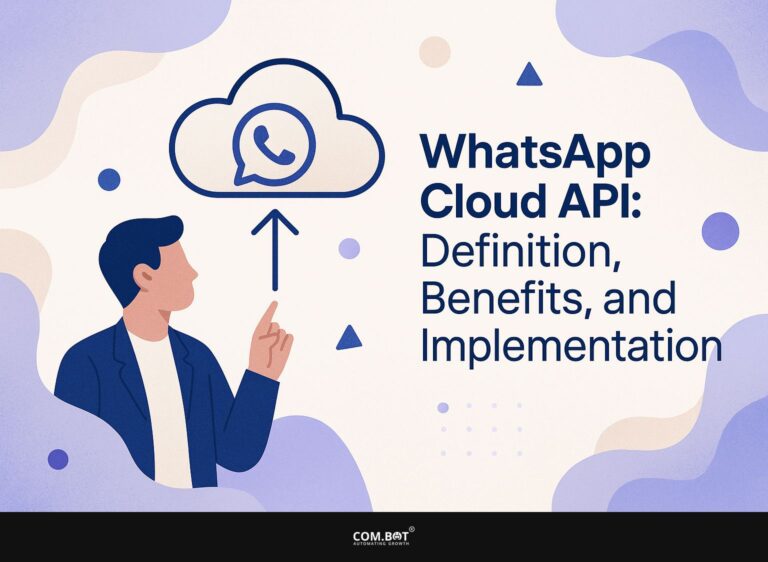How to Boost Sales with WhatsApp? Engagement Strategies
Businesses today are always looking for fresh, creative ways to connect with customers in a fast-changing online world.
WhatsApp has emerged as a powerful tool for sales, offering a unique blend of accessibility and personalization that can improve your marketing plan.
This article explains why WhatsApp is useful for sales. smart move, how to effectively set up your WhatsApp Business account, and engagement strategies to boost your sales.
By the end, you will have information to use the full potential of this platform.
Key Takeaways:
- Use WhatsApp to reach a larger audience and send personalised messages to increase sales.
- Use WhatsApp Business tools, make broadcast lists, and use WhatsApp Status for promotions.
- Connect with customers using custom messages, support services, and competitions. Measure success by checking open rates, reply rates, and conversion rates.
- 1 Why Use WhatsApp for Sales?
- 2 WhatsApp Sales Engagement Statistics
- 3 How to Set Up WhatsApp for Business?
- 4 Ways to Increase Sales through WhatsApp
- 5 Measuring Success on WhatsApp
- 6 Frequently Asked Questions
- 6.1 How can WhatsApp help boost my sales?
- 6.2 What are some good ways to use WhatsApp to increase sales?
- 6.3 How can group chats on WhatsApp help increase sales?
- 6.4 How can personalised messages on WhatsApp help increase sales?
- 6.5 Can WhatsApp be used for customer support?
- 6.6 Why should you monitor and study WhatsApp messages to increase sales?
Why Use WhatsApp for Sales?
WhatsApp is a helpful tool for sales, providing businesses with a simple method to talk to customers using live chats. With over 2 billion users worldwide, this messaging app offers extensive reach and easy access, helping brands connect with their audience using marketing strategies.
Through direct interaction and multimedia content, businesses can build strong relationships and increase sales, improving customer satisfaction and loyalty. WhatsApp’s tools allow brands to manage interactions more easily, making it a key tool for modern sales strategies. This approach aligns with the principles outlined in our analysis of Com.bot Rich Media Messaging, enhancing the way businesses connect with their customers.
WhatsApp Sales Engagement Statistics
WhatsApp Sales Engagement Statistics
WhatsApp Business Usage Stats: Adoption and Usage
WhatsApp Business Usage Stats: Consumer Preferences
WhatsApp Business Usage Stats: Marketing and Sales Effectiveness
The WhatsApp Sales Engagement Statistics show how businesses use WhatsApp to improve customer interaction, covering how they start using it, what consumers like, and how well it works for marketing. This data highlights WhatsApp’s critical role in modern business communication strategies.
WhatsApp Business Usage Stats show important information about usage and effectiveness. With 500 million businesses The popularity of WhatsApp is clear, as businesses look for effective ways to communicate. Out of these, 5 million businesses use the WhatsApp Business API, showing an increasing move towards automated and scalable ways to communicate. Notably, small businesses report a 67% improvement in communication efficiency, showcasing WhatsApp’s effectiveness in streamlining interactions.
- Consumer Preferences: A striking 74% of consumers prefer purchasing via messaging apps, showing a move towards real-time, interactive shopping. Moreover, 67% of customers favour messaging over phone or email for support, emphasising the convenience and immediacy of chat-based interactions. Security concerns are also addressed, with 68% of users valuing end-to-end encryption, fostering trust in the platform.
- Marketing and Sales Effectiveness: WhatsApp’s 98% message open rate is notably higher than traditional email marketing, highlighting its potential for direct and immediate engagement. Businesses benefit from a 30% reduction in communication costs through the API, underscoring the economic value of integrating WhatsApp into their communication strategy. The platform also helps decrease the number of abandoned shopping carts by 25%, enhancing sales conversion.
The insights from the WhatsApp Sales Engagement Statistics highlight the platform’s significant effect on business communication and sales. With high consumer preference for messaging, strong open rates, and cost-saving advantages, WhatsApp is an indispensable tool for businesses aiming to improve customer engagement and drive sales in a digital-first world. The data shows a good situation for businesses to take advantage of messaging apps, matching changing consumer expectations for smooth, safe, and effective interactions.
1. Wide Reach and Accessibility
WhatsApp is commonly used and simple to access, which makes it a favored option for companies looking to connect with millions of customers globally.
WhatsApp makes it easy for businesses to communicate with different groups through its simple interface on phones and computers.
Its global footprint allows retailers to tap into markets across different regions, facilitating seamless interactions that can lead to increased conversions.
By using WhatsApp’s features, like instant messaging and multimedia sharing, companies can adjust their marketing strategies to create unique experiences for their users.
This approach helps build customer loyalty and allows for immediate feedback, which helps businesses improve their products and increase customer satisfaction.
2. Personalised Communication
Using WhatsApp to talk directly with customers helps businesses create solid relationships, resulting in improved customer happiness and loyalty.
By knowing what customers like and how they act, brands can adjust their messages to connect more strongly with their audience. Dividing customers into groups by their past purchases or behavior can provide helpful details for making suitable offers and content.
For example, MoEngage used customised campaigns to send specific promotions based on how users interacted, leading to higher conversion rates. Adya Organics sent specific messages to customers about certain products, which led to more repeat purchases.
These plans show how customising interactions can build loyalty and strengthen relationships, which helps businesses grow.
3. Cost-effective Marketing
Using WhatsApp for marketing helps businesses save money on advertising and increase customer interaction.
This platform facilitates real-time communication, enabling brands to connect with their audience on a more personal level compared to traditional marketing channels, which are often more expensive and less interactive.
By using organic promotions, businesses can communicate updates, deals, and product details directly to customers, building a feeling of belonging and loyalty.
Brands like Clarks and Sephora have successfully used WhatsApp to connect with their target audiences, leading to high returns from their marketing efforts.
These companies show that sending customised messages to customers can increase sales while avoiding the expense of traditional ads.
How to Set Up WhatsApp for Business?
Setting up WhatsApp for Business is simple and helps brands talk to customers better using different messaging tools.
By downloading the WhatsApp Business app, businesses can create a professional profile to show key details like their website, business hours, and a short description of what they offer. This setup creates confidence and helps with customer support, making it simpler to deal with inquiries and provide fast responses.
Using WhatsApp’s features can lead to happier customers and better marketing strategies. Worth exploring: Com.bot Custom UI Chat Widget, which offers enhanced interaction capabilities.
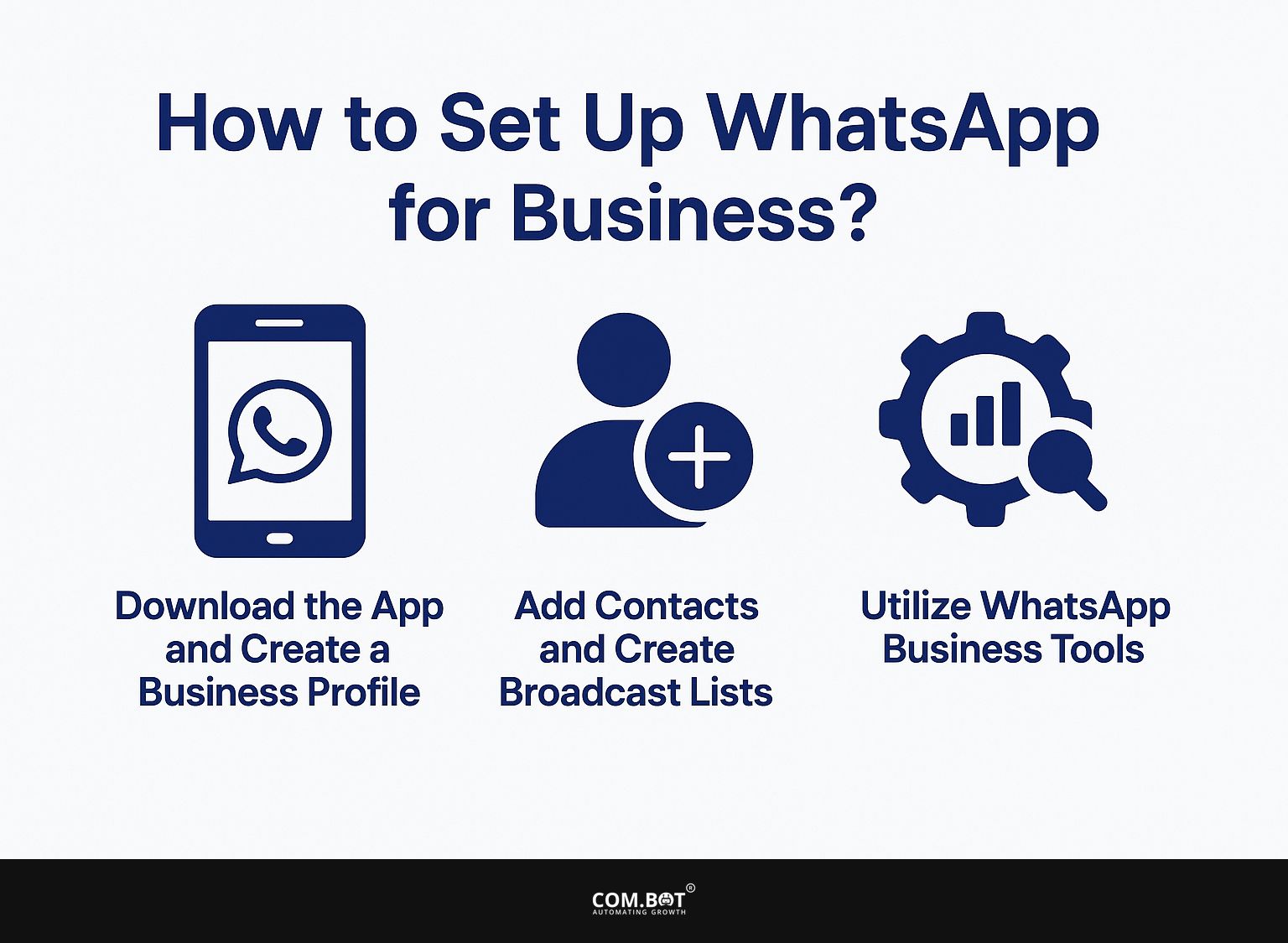
1. Download the App and Create a Business Profile
To get started with WhatsApp for Business, download the WhatsApp Business app from your device’s app store and create a dedicated business profile to represent your brand.
Start by finding the app and pressing ‘Install.’ After it finishes downloading, the next step is to create the business profile.
It’s important for the user to add key details like a phone number, business hours, and a clear, strong description of the business. This information is more than just formal; it strongly boosts brand image, which is key for winning customer trust.
By providing clear contact information and outlining what the business offers, customers are more likely to engage, knowing they can easily reach out for inquiries or support.
2. Add Contacts and Create Broadcast Lists
Once the business profile is set, adding contacts and creating broadcast lists becomes essential for effective customer engagement through WhatsApp.
By organising contacts according to what they like, what they have bought before, or their demographic information, businesses can divide their audiences more effectively. This segmentation lets you send customized messages that connect with specific groups, increasing the odds of a positive response.
Using broadcast lists makes communication easier. It lets businesses send updates, promotions, or useful tips to many contacts at once without flooding their inboxes.
Maintaining strong customer relationships necessitates consistent follow-ups and feedback collection, creating an environment of trust and loyalty. Involving customers with interactive content and quick replies strengthens their relationship with the brand and promotes continued participation and loyalty.
3. Utilise WhatsApp Business Tools
WhatsApp Business offers various tools that improve messaging, ease customer support, and make communication more efficient.
These tools include automatic replies, which help businesses give quick answers to common questions. This makes customers feel recognised, even when the business is closed.
Instant replies allow businesses to save and reuse common messages, making responses quicker.
Chat templates can be customised for different scenarios. This helps in keeping a consistent brand voice while meeting the varied needs of customers.
By using these features, companies can better connect with customers, build stronger relationships, and carry out more effective marketing campaigns that connect with their audience.
Ways to Increase Sales through WhatsApp
To increase sales on WhatsApp, businesses should use certain methods to engage with customers that build strong relationships and provide personalised experiences.
These strategies can include sending customised messages and special offers that connect with the audience, using the app’s features for real-time interactions and feedback. For businesses looking to automate these interactions, exploring Com.bot’s SMB WhatsApp Automation can be highly beneficial.
Handling customer service through WhatsApp lets businesses answer questions and support requests quickly, leading to increased customer happiness.
By focusing on engagement, brands can take advantage of opportunities to drive sales and grow their community presence.
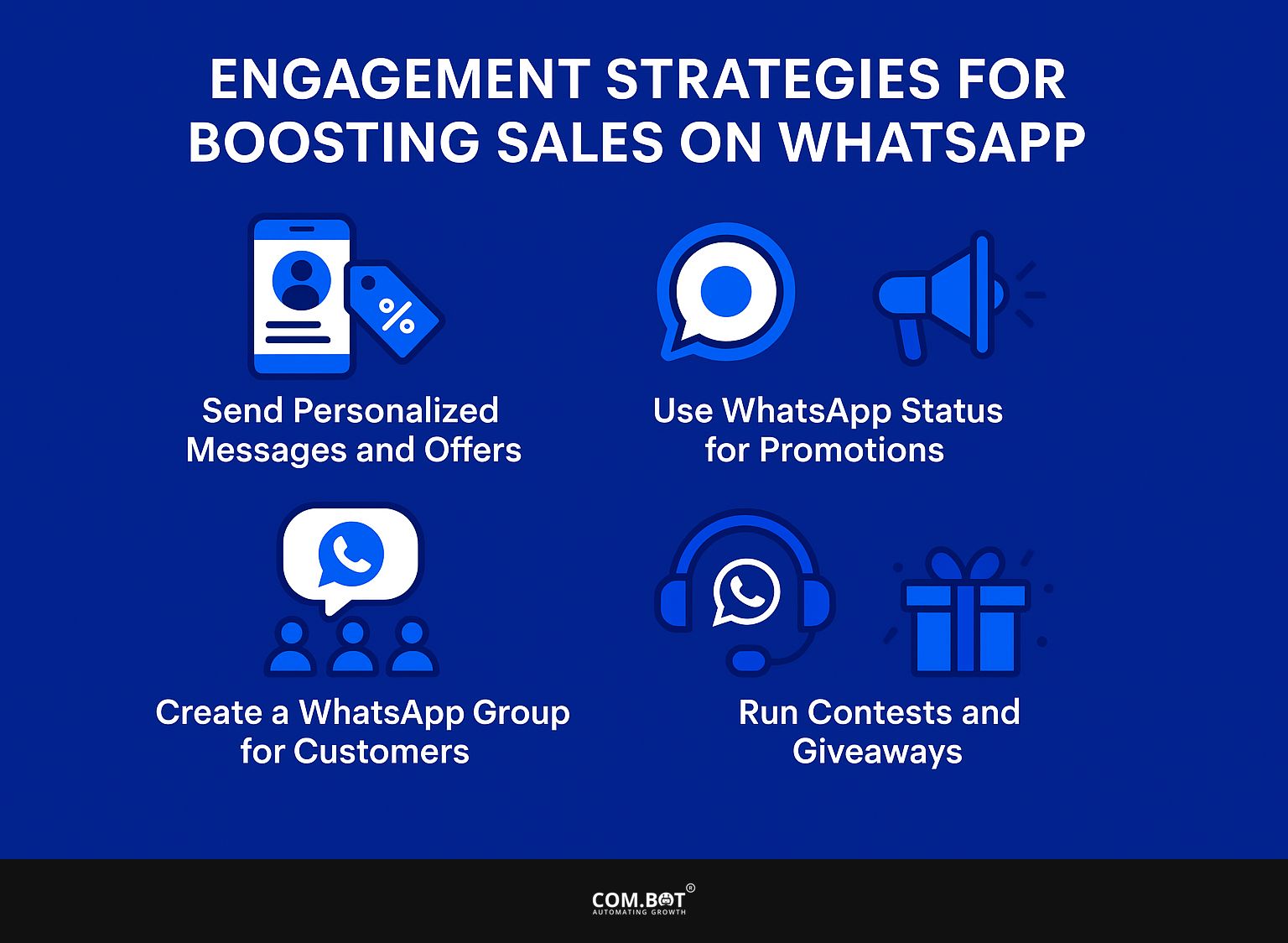
1. Send Personalised Messages and Offers
Sending custom messages and special offers through WhatsApp is a great way to connect with customers and improve their satisfaction.
By using customer information, brands can form groups based on actions, likes, or buying records. For instance, a clothing retailer might analyse past purchases to identify a group of customers who frequently buy athletic wear.
This information helps the brand create special offers for running shoes or fitness gear that match these shoppers’ interests. A well-known coffee company ran a successful campaign by sending customised deals through mobile alerts.
By sending custom offers that matched what people usually bought, they greatly increased the number of visitors and saw a clear rise in sales during a specific promotion. These strategies increase customer loyalty and improve the brand’s image by showing that it cares about its customer’s specific preferences.
2. Use WhatsApp Status for Promotions
Using WhatsApp Status for promotions is a new method to connect with more people and interact more with current customers.
By using this feature, companies can share current updates, attractive offers, and short interactive polls or questions to build a closer relationship with their followers.
For instance, a local cafe might post a Status showcasing a new seasonal drink, complete with a tempting image and a limited-time discount code, encouraging followers to visit before it’s gone.
Sharing behind-the-scenes content or customer testimonials through Status can create a sense of community and trust. The possible effect on sales is large, as interesting content can lead to quick purchases and recommendations from customers, which helps the brand grow.
3. Create a WhatsApp Group for Customers
Creating a WhatsApp Group for customers helps create a community and encourages active participation through direct chats.
People in this online community can talk about what they’ve gone through and what they think, feeling valued and heard.
By using this platform, businesses can collect immediate feedback from their customers, providing information that can help improve products or services.
Offering special deals directly to the group can increase sales and strengthen customer loyalty, as members like getting exclusive discounts.
To handle group interactions well, set clear rules for communication and actively lead discussions by asking questions.
Frequently recognising efforts and dealing with issues can greatly improve connections and create trust between group members.
4. Use WhatsApp for Customer Service
Using WhatsApp for customer service helps businesses give quick help and build good relationships with their customers.
Companies can use the platform’s instant messaging to quickly answer questions, reducing wait times and making interactions more personal. This fast reply makes customers feel valued and heard, boosting their confidence in the service.
Leading brands such as Zara and Sephora have successfully integrated WhatsApp into their customer service strategies, allowing their customers to receive support for inquiries related to product availability, order tracking, and even styling advice.
These interactions quickly solve problems and encourage customers to return, showing how good communication tools can improve customer experiences and build long-term loyalty.
5. Run Contests and Giveaways
Holding contests and giveaways on WhatsApp can greatly increase customer participation and raise brand visibility.
By using the platform’s personal nature, businesses can build a strong community feeling among participants.
When a brand encourages users to share their experiences or invite friends to join the contest, it creates organic growth through personal connections. Companies can increase user engagement and promote competition by using ideas like photo challenges or referral rewards.
A popular coffee shop started a campaign where customers could share their own special coffee recipes. This allowed people to show off their creativity and spread the word among their friends, which led to more attention and loyal customers.
Measuring Success on WhatsApp
Checking success on WhatsApp helps businesses see how their engagement methods are doing and improve their overall performance.
Tracking key numbers like how often messages are opened, how quickly people reply, and how many sales are made helps brands learn about customer interactions and adjust their marketing plans as needed.
Paying attention to data increases customer satisfaction, discovers ways to grow, and strengthens ties with the community, enabling businesses to remain competitive in a shifting market. For an extensive analysis of this trend, our Com.bot Conversational Analytics Dashboard offers tools to delve deeper into customer interactions and performance metrics.
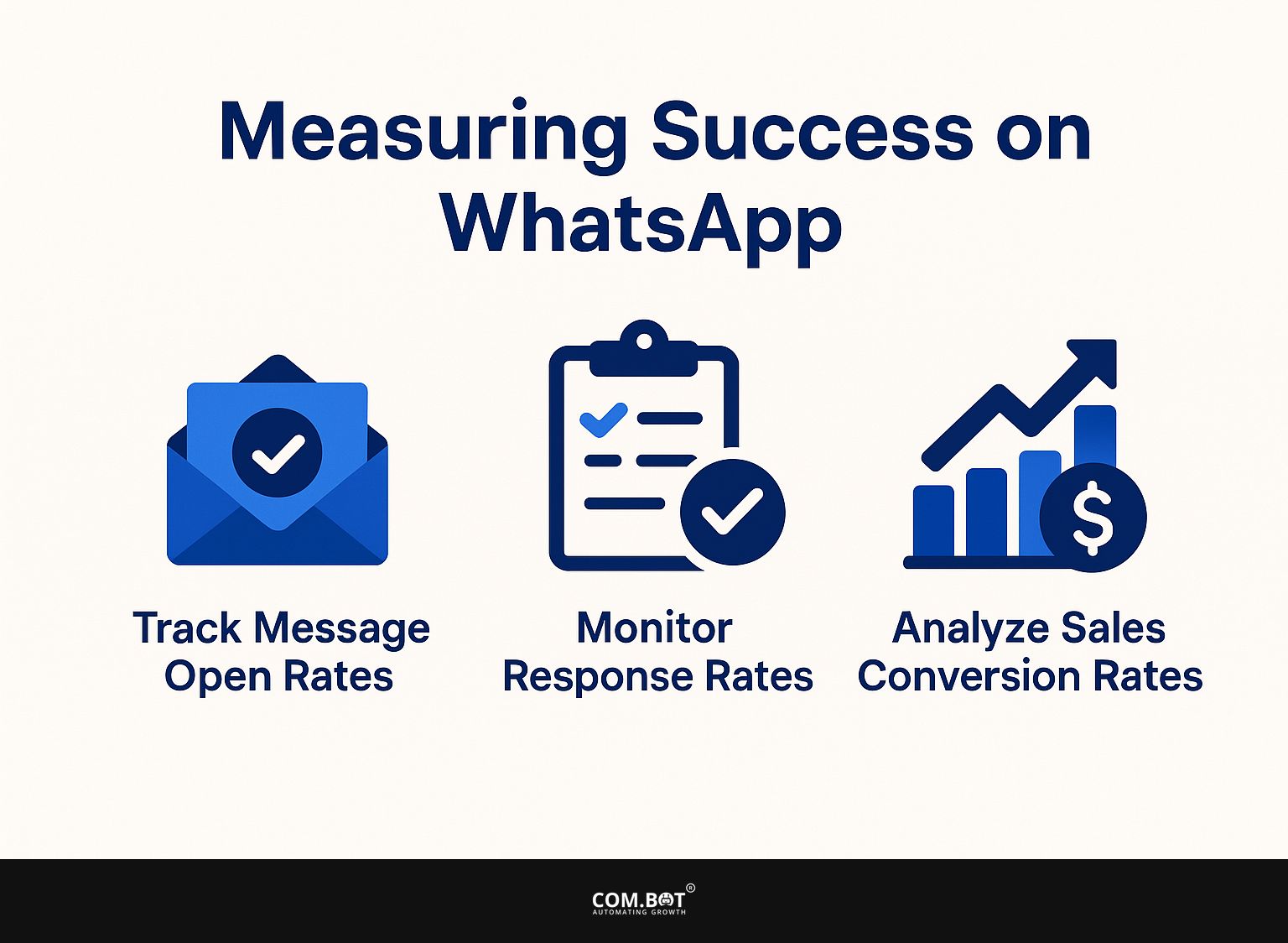
1. Track Message Open Rates
Checking how often messages are opened on WhatsApp helps understand customer interest and how well messaging plans are working.
By monitoring how often recipients open and read their messages, businesses can gauge the interest levels of their audience. This important data can guide changes to content, timing, and frequency, greatly improving outreach efforts.
For instance, if a business notices higher open rates during specific times of the day, they may find success by scheduling messages accordingly. Dividing audiences by how they engage can help create specific campaigns suited to different customer needs, leading to more personal and successful communication plans that build strong relationships.
2. Monitor Response Rates
Keeping track of how quickly people reply on WhatsApp is important for knowing how happy customers are and how good the conversations are.
These metrics show how much customers interact, helping businesses measure how well their communication methods work. When many people reply, it often means they feel important and listened to, which helps build a stronger connection.
To improve these rates, brands can send personalized messages, reply quickly, and use various types of content to keep people engaged. Answering questions quickly and handling inquiries well can greatly improve customer relationships.
By using these strategies, businesses increase engagement and build loyalty and trust with their customers.
3. Analyse Sales Conversion Rates
Analysing sales conversion rates on WhatsApp helps businesses assess the effectiveness of their marketing strategies and customer interactions.
By closely monitoring how many inquiries lead to actual purchases, organisations can identify strengths and weaknesses in their sales funnel. This metric shows how well we communicate with potential buyers and helps improve marketing campaigns.
For instance, if a particular approach is yielding low conversion rates, adjustments can be made to the messaging or targeting strategies. Understanding these rates helps businesses build better relationships with customers, allowing them to quickly adjust strategies and use approaches suited to their audience, leading to clear sales increases.
Frequently Asked Questions
How can WhatsApp help boost my sales?
WhatsApp is a powerful communication tool that allows you to directly engage with your customers. By using creative ways to connect with your audience, you can increase your sales through this platform.
What are some good ways to use WhatsApp to increase sales?
Some good methods include making group chats where people can interact, sending custom messages, and using WhatsApp to help customers. These methods can improve how customers interact with your business, which can result in higher sales.
How can group chats on WhatsApp help increase sales?
Group chats are a great way to engage with multiple customers at once. You can use group chats to share promo codes, launch new products, and provide exclusive deals to your customers. This creates a sense of community and can lead to increased sales.
How can personalised messages on WhatsApp help increase sales?
Sending customised messages to your customers helps build a closer relationship with them. This can help keep customers coming back and result in higher sales.
Can WhatsApp be used for customer support?
Yes, WhatsApp is a great platform for providing customer support. By using the app’s instant messaging and calling features, you can quickly address any customer concerns or inquiries. This level of convenience can lead to increased customer satisfaction and potentially more sales.
Why should you monitor and study WhatsApp messages to increase sales?
Looking at your WhatsApp interactions can help you see how well your plans are working. By tracking which messages and promotions get the most attention, you can change your strategy to increase sales.
